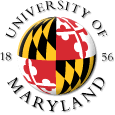| |
This page has a sampling
of papers that I have written that are available for downloading. Most
are available in Adobe Acrobat format, some also in WordPerfect or Word. If you don’t have
the Adobe Acrobat reader, click here to download it for free.
See also the new
page with
vintage papers!
Focus on trust, inequality, and corruption --
see my page page devoted to my
corruption
research and my book,
Corruption, Inequality, and the Rule of Law: The
Bulging Pocket Makes the Easy Life (Cambridge University Press, 2008,
paper 2010,
order here:
http://www.cambridge.org/us/catalogue/catalogue.asp?isbn=9780521874892
See also my page on research on
diversity, segregation, trust, and altruism
Most of the papers
are on trust and civic engagement, and inequality, which is the focus of my research.
My new paper with Bo
Rothstein,
"The Roots of Corruption," traces contemporary corruption to levels of
education across 78 countries in 1870. We argue that higher levels
of education both stem from and promote economic equality, which leads to
less corruption. We find strong evidence for path
dependence--countries with high levels of education in 1870 are more
likely to be equal today and equality is a key determinant of low
corruption. Higher levels of education are also indicative of state
capacity--and better governance.
See two papers on the foundation and measurement
of trust,
"Measuring Generalized Trust: In Defense of the Standard Question," in
Handbook of Research Methods on Trust, second edition, edited by Fergus
Lyon, Guido Mollering, Mark Sanders, and Tally Hatzakis; and
"The
Roots of Trust," in Yaojun Li, ed., The Handbook of Research
Methods and Applications on Social Capital. London: Edward Elgar,
2014.
"All for All:
Equality, Corruption, and Social Trust" (with Bo Rothstein of Goteborg University).
In this paper, which was published in
World Politics,
v. 58 (October 2005), 41-72.
We argue that means-tested welfare programs reduce levels of
generalized trust--and that universalistic policies lead to greater
trust. Means-tested policies stigmatize recipients, while
universalistic policies reflect the ideal of equality underlying
generalized trust. Download
the paper
as published in PDF format.
I show that the economic crisis of 2008 shaped
trust in government but not generalized trust in my paper,
"The Economic Crisis of 2008: Trust in Government and Generalized Trust,"
in Jared D. Harris, Brian Moriarity, and Andrew C. Wicks, eds.,
Public Trust in Business (Cambridge University Press, 2014).
My work also extends to other areas,
including legislative and electoral behavior. See my p aper,
with Mark Lichbach,
"Israel
and Evangelicals: The Two Front War for Jewish Votes." We pose a familiar question--why
American Jews continue to vote Democratic when most other groups in the
New Deal coalition have become less loyal to the Democratic party.
Traditional explanations focus on the liberalism of American Jews.
We provide support for this argument, but argue that an increasingly
important reason for the loyalty of Jews to aper,
with Mark Lichbach,
"Israel
and Evangelicals: The Two Front War for Jewish Votes." We pose a familiar question--why
American Jews continue to vote Democratic when most other groups in the
New Deal coalition have become less loyal to the Democratic party.
Traditional explanations focus on the liberalism of American Jews.
We provide support for this argument, but argue that an increasingly
important reason for the loyalty of Jews to the Democratic party is fear of evangelicals, who have become more
powerful in American society and especially within the Republican party.
Non-Jews were did not base their vote choices on attitudes toward
fundamentalists. For non-Jews views of the Christian Right were tied
in closely to other culture war issues (ideology, abortion, gay unions,
and gun control)--while for Jews, attitudes toward evangelicals were more
of an issue of identity than of a culture war over social issues.
the Democratic party is fear of evangelicals, who have become more
powerful in American society and especially within the Republican party.
Non-Jews were did not base their vote choices on attitudes toward
fundamentalists. For non-Jews views of the Christian Right were tied
in closely to other culture war issues (ideology, abortion, gay unions,
and gun control)--while for Jews, attitudes toward evangelicals were more
of an issue of identity than of a culture war over social issues.
Some Jews voted Republican and
Jewish Bush voters were distinctive in seeing Israel as the first or
second most important issue in the campaign. We analyze Jewish
voting behavior using a survey of American Jews conducted in 2004 for the
National Jewish Democratic Council by
Greenberg Quinlan Rosner
Research and we compare our findings with results for non-Jews using
the 2004 American National Election Study.
Download the non-technical summary
of the paper
here and our op-ed in The Forward
here.
I extend this work to the 2012 elections
using an election night survey conducted for J Street. Again, Jews
voted overwhelmingly for Democratic candidates and their vote choices were
largely based upon traditional partisanship and opposition to the Tea
Party--and not to positions on Israel. The Republican attempt to
sway Jewish voters through advertizing had no effect--it may have even
backfired--and Jewish voters' positions on Israel were closer to those of
President Obama than to Republican Mitt Romney. See "What's
the Matter with Palm Beach County?,"
presented at the Conference on "The U.S. Presidential Election: Campaign
and Results," Interdisciplinary Center, Herzilya, Israel, January 6-7,
2013; and a less technical paper written for a volume to be published by
the Casden Institute of the Jewish Role in American Life at the University
of Southern California (http://casdeninstitute.usc.edu/),
"American
Jews and the Elephant Question."
Many discussions
of trust argue that it mitigates risk. I show that this is indeed
the case in "Trust
as an Alternative to Risk," published in Public Choice,
157 (2013): 629-639. Trusting people are less likely to
see their neighborhoods as dangerous even if there is a real risk of
violence (based upon statistics from police departments). Using the
1996 Pew survey of metropolitan Philadelphia, I show that trust reduces
perceptions of risk controlling for being the victim of a crime, parental
warnings not to trust others, the neighborhood one lives in, and whether
someone watches local television news.
Oguzhan Dincer and
I show that there is indeed a robust relationship between trust and
economic growth across the American states. See our article, "Trust
and Growth," in Public Choice, 2010, 142:
59-67.
Kerem Ozan Kalkan,
Geoffrey Layman, and
I have investigated the roots of Americans' sentiments toward
Muslim-Americans (under revise and resubmit to the Journal of
Politics. We argue that Americans rate Muslims much as they
rate other out-groups, especially illegal immigrants, gays and lesbians,
people on welfare, and feminists--and also other minority groups,
including African-Americans, Asian-Americans, Hispanics, and Jews.
People who rate Jews and even Israel highly are more likely to have
positive feelings toward Muslims. And there is little clear
relation between fear of terrorism and attitudes toward Muslims--and we
show that the same syndrome of out-group attitudes preceded the 9/11
attacks. The paper was published in the Journal of Politics,
71 (November, 2009). Download the paper,
"A 'Band of Others'? Attitudes toward Muslims in Contemporary American
Society."
How persistent is
generalized trust?
"Where
You Stand Depends Upon Where Your Grandparents Sat: The Inheritability
of Generalized Trust” was published in Public Opinion Quarterly,
72, 2008. Using a person’s ethnic heritage (where their
grandparents came from) and the proportion of people of different ethnic
backgrounds in a state, I ask whether your own ethnic background matters
more than whom you live among. People whose grandparents came to the
United States from countries that have high levels of trust (Nordics,
and the British) tend to have higher levels of generalized trust (using
the General Social Survey from 1972 to 1996). People living in states
with high German or British populations (but not Nordic populations) are
also more trusting (using state-level census data). Italians, Latinos,
and African-Americans also tend to have lower levels of trust, but it is
not clear that country of origin can account for these negative results.
Overall, there are effects for both culture (where your grandparents
came from) and experience (which groups you live among), but the impact
of ethnic heritage seems stronger.
How should we
measure trust? Traditionally the "standard question" is a
dichotomy--either we say that most people can be trusted or that you
can't be too careful in dealing with people. Now several people
say that the dichotomy is problematic and that an eleven-point scale is
preferable. I reexamine this issue and find that eleven-point
scales (as well as seven-point scales and even five-point scales) are
subject to the problem of "clumping," or excessive selection of the
midpoints on the scales. I examine data from the American National
Election Studies 2006 Pilot survey, the European Social Survey, and the
Citizenship Involvement Democracy Surveys in Romania and the United
States. The dichotomous measure stands up well compared to the
"newer" measures. Download the paper
here.
Read my part of a
debate with Sjoerd Beugelsdijk over what trust means. Is it merely
a surrogate measure for good institutions or is it a moral value?
See his
paper in the Cambridge Journal of Economics and my response,
"The Foundations of Trust: Macro and Micro," in the same journal
(2008).
In The Moral
Foundations of Trust, chs. 5 and 8, I argue that generalized trust
does not stem from government, but that trust can generate better
government performance. In "The
Civil State:
Trust, Polarization, and the Quality of State Government" (in
Jeffrey Cohen, ed., Public Opinion in State Politics (Stanford:
Stanford University Press, 2006), 142-162, I examine the link between
generalized trust and the performance of government in the American
states. Using measures from the Government Performance Project of
Governing magazine and the Maxwell School of Citizenship at
Syracuse University, the Ford Foundation/Kennedy School awards for
government performance, and measures of corruption in the states (from
reporters' perceptions), I find generally strong linkages between trust
and government performance--especially for corruption. Legislative
polarization also leads to less effective state government, though there
is less evidence that mass polarization matters.
In "Trust
as a Moral Value," in Dario Castiglione, Jan W. van Deth, and
Guglielmo Wolleb, eds., Handbook of Social Capital (Oxford: Oxford
University Press, 2008), 101-121, I summarize my work on trust in The
Moral Foundations of Trust. The paper is short and
non-technical: I focus on the different types of trust (generalized
trust, particularized trust, strategic trust) and discuss whether--and
how--government might shape trust.
Why do
businesspeople pay taxes? In "Tax
Evasion, Corruption, and the Social Contract in Transition," in James Alm, Jorge Martinez-Vazquez, and Benno Torgler,
eds., Tax Compliance and Tax Evasion (London: Routledge), I use the
Business Enterprise and Environment Performance Surveys (BEEPS)
conducted for the World Bank and the European Bank for Reconstruction
and Development in 2002 and 2005 to examine this question. Both
firm-level and aggregate analyses indicate that businesses are most
likely to evade taxation if they believe that the level of corruption is
high and if they see the level of public services as unsatisfactory.
High levels of trust lead to greater tax compliance, while increasing
economic inequality leads to more tax evasion.
Another of my papers continues my work on civility in
Congress. "Is the Senate More Civil Than the House?" (pdf version) was prepared for the Conference
on Civility and Deliberation in the Senate, sponsored by the Robert J.
Dole Institute and the Pew Foundation, July 16, 1999. It was
published in Burdett Loomis, ed., Esteemed Colleagues (Washington:
Brookings Institution, 2000). Also see my testimony and prepared statement on "Civility in the House of Representatives" to the House of Representatives
Rules Committee Subcommittee on Rules and Organization of the House, April
17 and Mary 3, 1997.
On September 26, 2004 I
participated in a panel on
Legislative Civility at the Western Committee on the Future of Western
Legislatures in conjunction with the Council of State Governments/CSG-West.
Download my handout to delegates in
Word
format.
Thomas Zittel of the
University of Mannheim and I have written an analytic essay on recent
research on legislatures in our paper,
"Comparative Legislative Behavior," forthcoming in R.A.W. Rhodes,
Sarah Binder, and Bert Rockman, eds., Oxford Handbook of Political
Institutions (Oxford University Press, 2006).
Many other papers
and my Russell Sage grant proposal are currently available and the interim
report for my Starr Foundation/IREX grant are available:
On September 20,
2002 I gave the keynote address to a conference on "Trust in the
Knowledge Society" at the University of Jyvaskyla, Jyvaskyla, Finland.
(The same paper was delivered at Oxford University on February 14,
2003 and at the University of Haifa, June 10, 2003 and the Hebrew
University of Jerusalem, June 12, 2003).
Download the paper,
"The Moral Foundations of Trust," which comes from my
book of
the same name. The paper is in both
WordPerfect
and
PDF
formats.
Also available: "Trust as a Moral Value," presented
at the Conference, "Social Capital: Interdisciplinary Perspectives,"
University of Exeter, United Kingdom, 15-20 September, 2001 and to be
published in a revised version in Dario Castiglione, Jan van Deth and
Guglielmo Wolleb, eds., Handbook of Social Capital (Oxford
University Press, 2004) as a
Word file. This revised version
summarizes the literature on trust and presents a new result showing
that diversity alone does not lead to more or less trust--but
residential segregation in nations depresses trust.
Also available: "Trust, Democracy,
and Governance:
Can Government Policies Influence
Generalized Trust?" in Dietlind Stolle and Marc Hooghe,
eds., Generating Social Capital (Palgrave, 2004) in
Word.
In July, 2003 I
gave a talk, "Generalized Trust and Why It Matters for Business in an
Age of Globalization" to the
Caux
Initiatives for Business Conference for Business and Industry,
Globalization: Closing the Gaps. I argue that trust is a key
factor in helping overcome the problems of globalization and in
promoting a more globalized world and that it offers great benefits
for business in securing a more cooperative and diverse workplace.
Download this non-technical talk prepared for audience from business
and non-profit organizations in
Word format. Download the
PowerPoint presentation.
In Uppsala, Sweden, there is
sufficient trust so that many people do not feel the need to to lock
their bicycles when they go away:
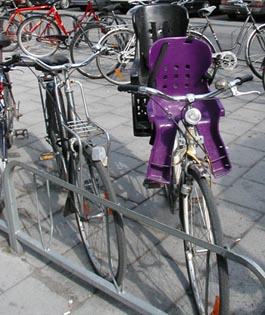
I
co-authored a paper with Kerem Ozan Kalkan, a graduate student in
Government and Politics,
"American Support for Aid to Turkey After World War II," at the
Conference on the History of American-Turkish Relations: 1833-1989,"
sponsored by Bogazici University, Harran University in Urfa, and the
Public Affairs Office of the U.S. Consulate, Istanbul, Turkey, June
4-10, 2006. Here we are (Uslaner on right, Kalkan in center)
with Walter Douglas of the U.S. Consulate:

Social interaction in Jerusalem: Generalized trust or passing in
solitude?
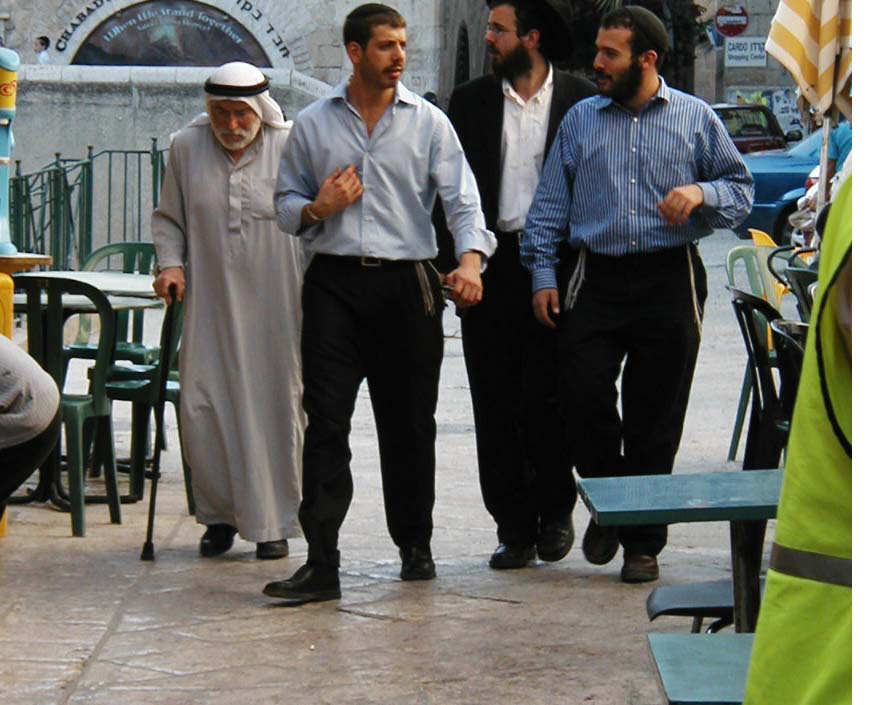
"Terrorism and
Trust: Sustained Violence and the Social Fabric in Israel" (with
Daphna Canetti-Nissim and Ami Pedahzur of the University of Haifa): An
examination of how sustained terrorism leads to lower levels of trust
in strangers, greater nationalistic patriotism, and to greater support
for militant solutions to the Israeli-Palestinian conflict. We
also show a reciprocal relationship between militancy and
trust--higher levels of trust lead to lower levels of militancy.
We examine seven surveys from 2000 to 2003 to make these claims and
also show that levels of trust vary over time with the extent of
terrorism Israelis face. Download the paper in
Word format.
Also see "Trust and Terrorism: Reflections on a
Theoretical Framework and Some Empirical Findings," a summary of the
"Terrorism and Trust" paper and of related findings on the effects of
trust and terrorism in the United States. This brief summary was
prepared for the International Assembly on Managing the Psychology of
Terror" sponsored by Issues
Deliberation America/Issues Deliberation Australia.
Austin, TX, August 19-21, 2004. Download the summary in
PDF format.
Making laws where they are least
needed: The parliament in Helsinki, Finland, one of the most trusting
societies in the world:
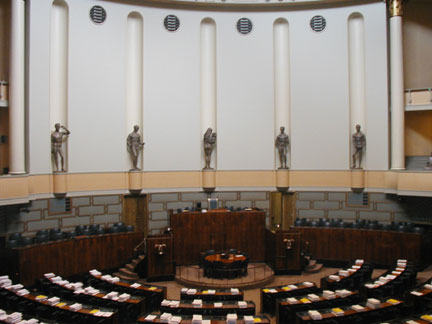
And in another
high trusting society, the Riksdag in Sweden:
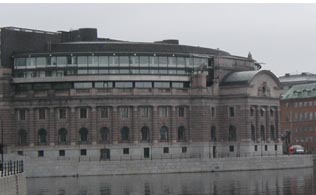
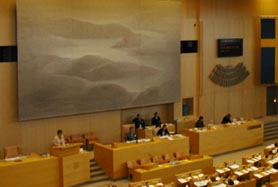
Here I am with Bruno von Sydow, the Speaker of the Riksdag:
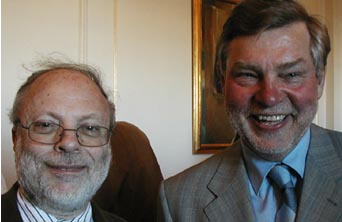
I gave a keynote speech to the
International Conference on Social Capital of the Economic and
Research Institute of the Cabinet Office, Government of Japan, Tokyo,
March 25, 2003. Download the
paper I wrote for that conference and the two PowerPoint
presentations,
"Trust and Economic Growth in the Knowledge Society" and
"Trust in the Knowledge Society."
Routine business in Japan depends
upon social capital:

And there is no shortage of picnics in the park in
Tokyo:
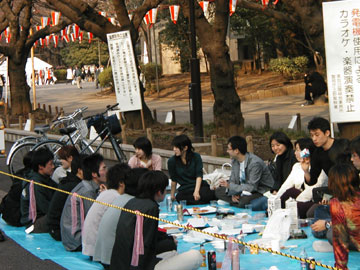
Here I am with a geisha at a restaurant in Tokyo; my host is Dr.
Takashi Omori of the Economic and Social Research Institute of the
Government of Japan:
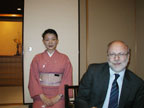
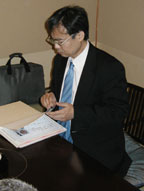
I have also written a short
nontechnical paper summarizing my work on trust for a an issue of European Political Science
(volume 2, 2003, 43-48), edited
by
Sigrid Roßteutscher and Spencer Wellhofer. Download it in
WordPerfect or
PDF formats.
I currently have
a three-year (2001-2004) grant from the Russell
Sage Foundation. The grant is for a project,
"Inequality, Trust, and Civic Engagement." In this
research I seek to explain falling levels of civic engagement in the
United States from the 1960s to the present. Fewer Americans are
participating in civic life, especially in arenas that demonstrate a
strong commitment to one’s community such as giving to charity and
volunteering time. I argue that rising levels of economic inequality
are a key reason why participation has fallen. But the relationship
between inequality and declining participation may not be direct. I
offer an alternative explanation: Rising inequality makes people less
optimistic for the future, which makes them less trusting of others,
and thus less likely to take part in activities that bind them to
their communities. I shall test this claim through statistical models
and present findings to both the scholarly community and to the larger
public. Download the grant proposal in either
pdf
format or WordPerfect
format.
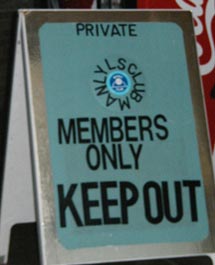
Not all volunteering, even
for good causes, brings people of different backgrounds together to
create (or rely upon) generalized trust. Note the sign at the
Manley Beach Life Saving Club in Sydney, Australia.
From the Russell
Sage project, M. Michell Brown of the University of Maryland and I
have written "Inequality, Trust, and Civic Engagement,"
American Politics Research, 33 (2005).
We examine
why people ‘violate’ rationality and take part in their communities,
differentiating by types of participation, particularly political
versus other, more communal, types of participation. We argue that
trust plays an important role in participation levels, but contrary to
more traditional models, the causal relationship runs from trust to
participation. In addition, we posit that trust is strongly affected
by economic inequality. Using aggregated American state level data
for the 1970s, 80s and 90s, we present a series of two-stage
least-squares models on the effects of inequality and trust on
participation, controlling for other related factors. Findings
indicate that inequality is the strongest determinant of trust, and
that trust has a greater effect on communal participation than on
political participation.
Download
the published paper in PDF format.
"Where You Stand
Depends Upon Where Your Grandparents Sat: The Inheritability of
Generalized Trust" examines the roots of generalized trust from the
General Social Survey in the United States. Using a model based
upon my earlier work, I find that ethnic heritage (especially
for people of Nordic and British background) leads to increased trust,
but the share of people of different ethnic groups has considerably
less effect on trust. Thus, your heritage seems to count more
than the composition of the ethnic communities where you live.
Download the paper in
PDF format.
A community
event brings people of all backgrounds together: black, white, yellow,
red,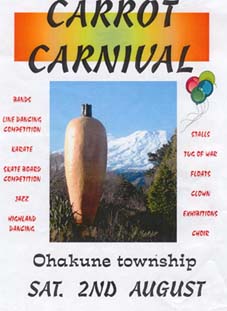 and, in Okahune township, New Zealand, even orange for the Carrot
Carnival every August: and, in Okahune township, New Zealand, even orange for the Carrot
Carnival every August:
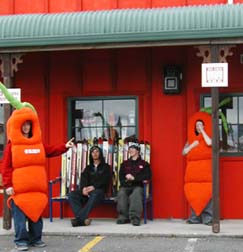
I wrote a paper
summarizing what we know about civic engagement for the Knight
Foundation's Civic Engagement Project Co-Directed by The Democracy
Collaborative, University of Maryland–College Park and the Center for
the Study of Voluntary Organizations and Service, Georgetown
University. Download the paper, "Civic Engagement in America:
Why People Participate in Political and Social Life" in either
WordPerfect or
PDF format.
"Sex, Lies, and
Audiotapes: The Watergate and Monica Lewinsky Scandals in American
Politics, In John Garrard and James A. Newell, eds., Scandals in
Past and Contemporary Politics (Manchester, UK: Manchester
University Press, 2004, forthcoming) is an examination of the greater
partisanship involved in the Clinton impeachment compared to the Nixon
impeachment among the public. Download the paper in
Word format.

"Civil Society
Development on the Black Sea: Social Involvement in the Republic of
Moldova and Romania," Interim Report to the International Research and
Exchanges Board (with Paul Sum, Gabriel Badescu, Mihai Pisica, and
Cosmin Marian) on the results of our surveys of trust and civic
engagement in Romania and the Republic of Moldova among both the mass
public and organizational activists. The grant was administered
by IREX under the
Black and
Caspian Sea Collaborative Research Program funded by the Starr
Foundation. Download the report in
Word format.
"Trust as an
Alternative to Risk," presented at the C onference
on
"Trust and
the Management of Technological Risk: Implications for Business and
Society," University of Zurich (Switzerland), September 17-20, 2003,
and at the
Conference on Trust, Department of Philosophy, University of
California--Riverside, February 27-28, 2004.
I present an argument that people who trust others underestimate the
level of risk in daily life and present evidence, from the Pew Civic
Engagement Survey in metropolitan Philadelphia in 1996, where
people
were asked about the safety of walking in their neighborhoods at
night. Trusters were far more likely to say that their
neighborhoods were safe, even controlling for the actual level of
violence in their neighborhoods, where they lived, whether they had
been the victim of a crime, or their parents had been the victims of
crime. Download the paper in
PDF format.
A
less technical
version is forthcoming
in M.
Siegrist, H. Gutscher, and T. C. Earle (Eds.), Trust, Technology,
and Society: Studies in Cooperative Risk Management (London:
Earthscan, 2005 onference
on
"Trust and
the Management of Technological Risk: Implications for Business and
Society," University of Zurich (Switzerland), September 17-20, 2003,
and at the
Conference on Trust, Department of Philosophy, University of
California--Riverside, February 27-28, 2004.
I present an argument that people who trust others underestimate the
level of risk in daily life and present evidence, from the Pew Civic
Engagement Survey in metropolitan Philadelphia in 1996, where
people
were asked about the safety of walking in their neighborhoods at
night. Trusters were far more likely to say that their
neighborhoods were safe, even controlling for the actual level of
violence in their neighborhoods, where they lived, whether they had
been the victim of a crime, or their parents had been the victims of
crime. Download the paper in
PDF format.
A
less technical
version is forthcoming
in M.
Siegrist, H. Gutscher, and T. C. Earle (Eds.), Trust, Technology,
and Society: Studies in Cooperative Risk Management (London:
Earthscan, 2005
"What is a
Good Citizen? How Romanians Think of Citizenship Obligations,"
for the Conference on Contemporary Citizenship: The Politics of
Exclusion and Inclusion: Is There a Chance for a Post-National
Citizenship?, Ljubljana, Slovenia, December 5-6, 2003. Romanians
have stronger expectations that good citizens will obey the law than
they will be active in civic life or think of others. Underlying
almost all expectations of good citizenship (using the CID survey of
the Romanian public) are views of government performance rather than
senses of social values (trust and tolerance) or group ties.
Download in
PDF format.
"Political
Parties and Social Capital, Political Parties or Social
Capital," for Richard S. Katz and William F. Crotty, eds., Handbook
of Political Parties (Sage, forthcoming, 2004). Download the
paper in
PDF format. I argue that political parties do not (and
perhaps ought not) to encourage civic participation in party
activities. Nor do they lead to greater trust in fellow
citizens. Parties are organizations for winning elections and
too much participation can make this task difficult.
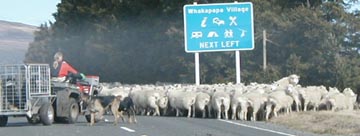

Two pictures of very dense social
capital. We made 2,505 new friends (2,500 sheep, 2 people, and 3
dogs) outside Wakahapa Village, New Zealand in July, 2003. They
kept us company for almost half an hour. In the bottom picture,
we are in the white car in the center.
"Trust and Social Bonds: Faith in
Others and Policy Outcomes Reconsidered," a response to Rodney Hero's
article, "Multiple Traditions in American Politics and Racial Policy
Inequality," both forthcoming in September, 2004 (v. 57) in Political Research
Quarterly. Hero argues that new data on policy outcomes
shows that social capital may often lead to worse outcomes (in
economics and education, among others) for minority populations in the
American states. I argue that some of Hero's estimates are
misplaced and others show quite strong positive connections of more
equal outcomes with trust. I also show that levels of trust and
economic inequality within the African-American community do
not shape state-level African-American participation in political and
civic life. However, higher levels of trust among all citizens
and lower levels of overall economic inequality are strongly connected
to higher rates of African-American participation. Download the
PDF file.
Social connections in Istanbul (right)
and Athens (left), where men (but not women) drink coffee and gamble
at cafes:
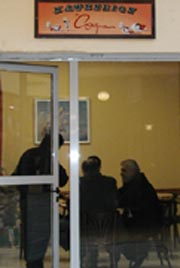
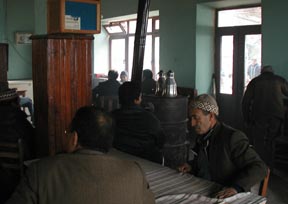
Men also gather in Greece's National
Garden to toss dice (left), but it seems to be a place where social
connections may not be connected to trust (right):
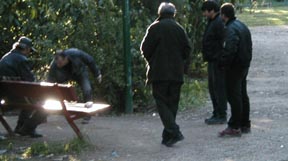 
"Trust and Civil
Society in East and West," in Gabriel Badescu and Eric M.
Uslaner, eds., Social Capital and the Transition to Democracy (Routledge,
2003). This paper, available in
Word format, applies the model in my
The Moral
Foundations of Trust to a comparison of Western publics with
citizens of the former Communist countries. The same general
model holds in both countries; trust is lower in the former Communist
countries because optimism and especially a sense of control is far
lower.
Hungarians
bowling (but not alone) in a Budapest mall:

Bowling is even bigger in Ljubljana,
Slovenia (but never alone):


But almost alone: "Bowling
Almost Alone: Political Participation in a New Democracy," for the
2004 Joint Sessions of Workshops at the European Consortium for
Political Research (download
PDF): What underlies conventional and unconventional participation
in Romania? Contrary to much research in the West, conventional
and unconventional participation have different roots: People who are
satisfied with life and who join civic associations take part in
conventional politics, but people who believe that the system is
stacked against them engage in protest politics.
Even in the
United States, lots of people bowl in groups, especially in
highly-educated suburbs with blue politics:
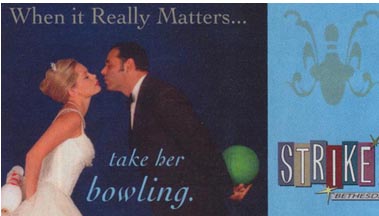
Dietlind Stolle
and I examined "The Structure of Trust in Canada" in a paper presented
at the Association for Canadian Studies meetings in November, 2003.
We found few connections with civic engagement using the Equality,
Security, Community survey in 1999/2000. We found strong
negative effects for in-group ties, for Quebecois--and we also found
that people who viewed the courts (and important vehicle for national
unity in Canada) are more trusting. We also found small
correlations between perceptions of who would return wallets (a
measure of honesty sometimes linked to trust) and generalized trust.
Download the paper in Word format.
"Trust and
Consequences": a non-technical summary of my work on trust and
civic engagement presented at the Communitarian Summit, February,
1999, Arlington, VA (pdf version, WordPerfect version). Also available is
the more technical version published in Political Science
Quarterly, v. 115 (December, 2000), pp. 569-590 under the title
"Producing and Consuming Trust" (pdf
version, WordPerfect
version)
"Social Capital,
Television, and the ‘Mean World’: Trust, Optimism, and Civic
Participation," Political Psychology, v. 19 (September,
1998), pp. 441-467 (typescript: pdf version, WordPerfect version). This is the paper that
exonerates television as a cause of the decline in trust and/or civic
engagement in the United States.
"Trust But
Verify: Social Capital and Moral Behavior," Social Science
Information, v. 38 (March, 1999), pp. 29-56 (typescript, pdf version, WordPerfect version). This paper examines the
linkage between trust in other people and commitment to strong standards
of moral behavior using data from the World Values Surveys.
"Democracy
and Social Capital," in Mark Warren, ed., Democracy and Trust
(Cambridge: Cambridge University Press, 1999), pp. 121-150 (typescript,
pdf version, WordPerfect version). Early summary of my research
on trust and its relationship to democratic government.
(with Richard Conley): "Civic Engagement and Particularized Trust :The
Ties that Bind People to Their Ethnic Communities" (originally
presented at the 1998 Annual Meeting of the American Political Science
Association, published in American Politics Research, 31, July,
2003) (pdf version). Ethnic ties may
lead people to withdraw from civic engagement in the larger society.
Using a Los Angeles Times survey of ethnic Chinese in Southern
California, we show that people who restrict their social ties to
their own group and who are wary of American culture more generally
are less likely to participate in the politics of the larger society.
"Is Washington
Really the Problem?" Prepared for presentation at the Hendricks
Symposium of Dissatisfaction with American Government, University
of Nebraska–Lincoln, October 8-11, 1998 (pdf version, WordPerfect version). This paper argues that
people who distrust government don’t like any level of
government. Thus proposals to decentralize authority will not
restore confidence in government. This essay was published
in John Hibbing and Elizabeth Thiess-Morse, eds., What Is It
About Government That Americans Dislike? (New York: Cambridge University
Press, 2001).
"Voluntary
Organization Membership in Canada and the United States," presented
at the 1997 Annual Meeting of the Association for Canadian Studies
in the United States (pdf version, WordPerfect version). I show that Americans
and Anglophone Canadians are more likely to trust others than are
Quebecois–and that trust matters more for civic engagement in
the United States than for either group of Canadians. Canadians, and
especially Quebecois, are more likely to put their faith in groups
they know rather than individuals they don’t know.
Volunteering
at the top of North America: The volunteer fire department of
Whitehorse, Yukon, Canada: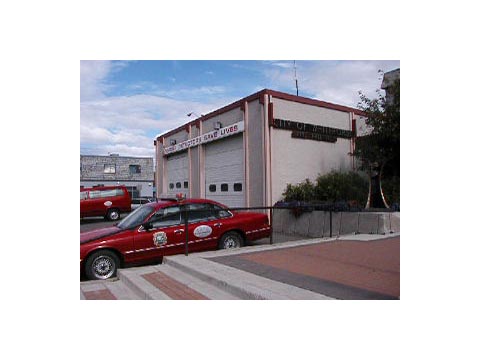
"Strong
Institutions, Weak Parties: The Paradox of Canadian Political Parties,"
presented at the 2000 American Political Science Association meetings
for a comparative panel on the 50th anniversary of the APSA Committee
on Political Parties report, "Toward a More Responsible Two-Party
System" (pdf
version, WordPerfect
version)
"The Internet
and Social Capital," which appeared in the Communications
of the ACM (Annals of Computing Machinery), v. 43 (December,
2000), pp. 60-64. The paper examines the
relationship between Internet usage, trust, and social connections
(pdf
version, WordPerfect
version).
"Trust,
Civic Engagement, and the Internet," a paper originally prepared for the
2001 European Consortium for Political Research Workshops in Grenoble,
France. It will be published in Political Communication,
21 (2004). The paper extends the earlier analysis of surveys by the
Pew Internet and American Life Project and concludes that the Internet
does not shape trust, although mistrusters are more likely to hide
their true identity on the Internet. Indeed, visiting chat rooms
and making new friends on line seems associated with using fake
identities. Download the pdf
version from the Pew Internet and American Life website or the
final
version for publication (also in PDF).
"Trust, Democracy,
and Inequality," forthcoming (as translated into Romanian) in
Sfera Policii, journal of the Institute for Political and Economic
Research, University of Bucharest and based upon a talk to the Romanian
Cultural Foundation, January, 2000 (pdf
version, WordPerfect
version)
"The Democratic
Party and Free Trade: An Old Romance Restored," published in
NAFTA:
Law and Business Review of the Americas,
v. 6 (Summer, 2000), pp. 347-362 and originally presented at the Conference on
The United States and the Future of Free Trade in the Americas, John
Tower Center for Political Studies, Southern Methodist University,
March, 2000. I argue in this paper that the party that takes
a more pro-trade position is more likely to win the Presidency.
Moreover, free trade does not cost Congressional Democrats
at election time (pdf
version, WordPerfect
version).
Also available
are my detailed notes for the talk I gave at the University of Maryland's
Internet series on "The Internet and Civic Engagement."
Can the Internet build trust, can it destroy trust, or are the reputed
effects of the new technology overblown? Can the Internet build
(or destroy) communities? Download either the pdf
version or the WordPerfect
version.
|
